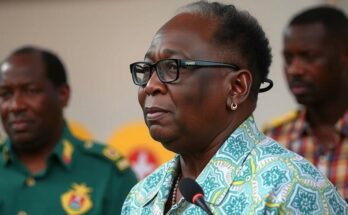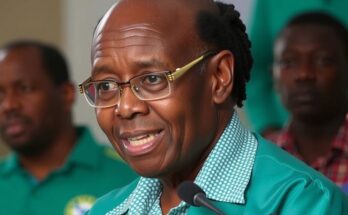Independent experts from the Carter Center have substantiated opposition claims that Nicolás Maduro lost the recent presidential election in Venezuela. They validated tally sheets collected during the election and emphasized that the electronic voting system provided reliable results. Despite the government’s rapid declaration of Maduro’s victory, independent verification is essential for electoral integrity, and calls for detailed voting data continue from the OAS and various governments.
An independent body of election experts has validated the tally sheets presented by the opposition as evidence of Nicolás Maduro’s defeat in the recent Venezuelan presidential election. During a meeting with the Organization of American States (OAS), a representative from the Carter Center, a U.S.-based organization, confirmed that the electronic voting system functioned effectively and that various stakeholders, including the ruling party, are aware of the actual electoral outcome. This observation comes in the wake of the July 28 election, which was marred by controversy regarding the official results declared by government-aligned electoral authorities, who prematurely announced Maduro’s victory without providing a comprehensive breakdown of the results. In a notable contrast, the opposition coalition secured tally sheets from over 80% of voting machines and made these documents publicly available online, despite the government’s claims of falsification and subsequent investigations targeting opposition figures, including candidate Edmundo González. Jennie Lincoln, who led the Carter Center’s mission, highlighted the importance of the paper trail provided by the electronic voting machines, stating that “the voting system is electronic, but it offers a paper trail – proof of what the electronic machine reports – and that is what was collected by tens of thousands of poll watchers, not just from the opposition, but also from the government party, the PSUV, that also has the same information.” Though she refrained from declaring a winner, she underscored the necessity for electoral authorities to take responsibility for the announcement of election outcomes. The Carter Center received the tally sheets shown to diplomats via international mail, though the source of these documents was not disclosed. The OAS and several member states have called on Venezuela’s electoral authorities to publish detailed voting data, amid rising tensions and skepticism surrounding the integrity of the electoral process. This session was organized at the request of multiple nations, including Argentina, Costa Rica, and the United States.
The current political climate in Venezuela is deeply turbulent, characterized by significant electoral disputes and a lack of transparency in the electoral process. The presidential election held on July 28 was contested by the opposition, which claims to have evidence demonstrating that Nicolás Maduro lost the election. Amidst these tensions, independent observation of the electoral process is crucial not only for the legitimacy of the results but also to ensure the accountability of governing bodies. The Carter Center and the Organization of American States (OAS) play vital roles in this context as they encourage fair elections and call for detailed reporting of voting results to affirm democratic processes in member states.
In summary, the independent validation of the opposition’s tally sheets by experts from the Carter Center has cast significant doubt on the official results of the Venezuelan presidential election that claimed victory for Nicolás Maduro. This observation highlights the need for transparency and accountability in electoral processes. As international organizations like the OAS push for detailed electoral data releases, the ongoing disputes in Venezuela underscore the challenges faced in maintaining democratic integrity and trust in national governance.
Original Source: www.cbsnews.com




